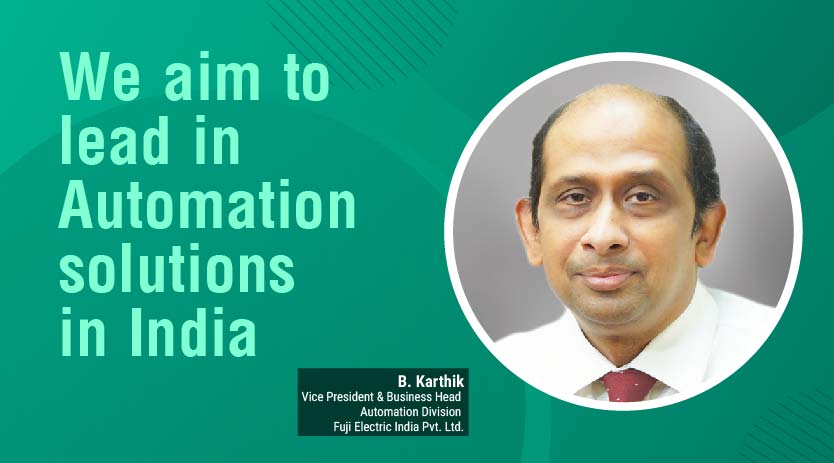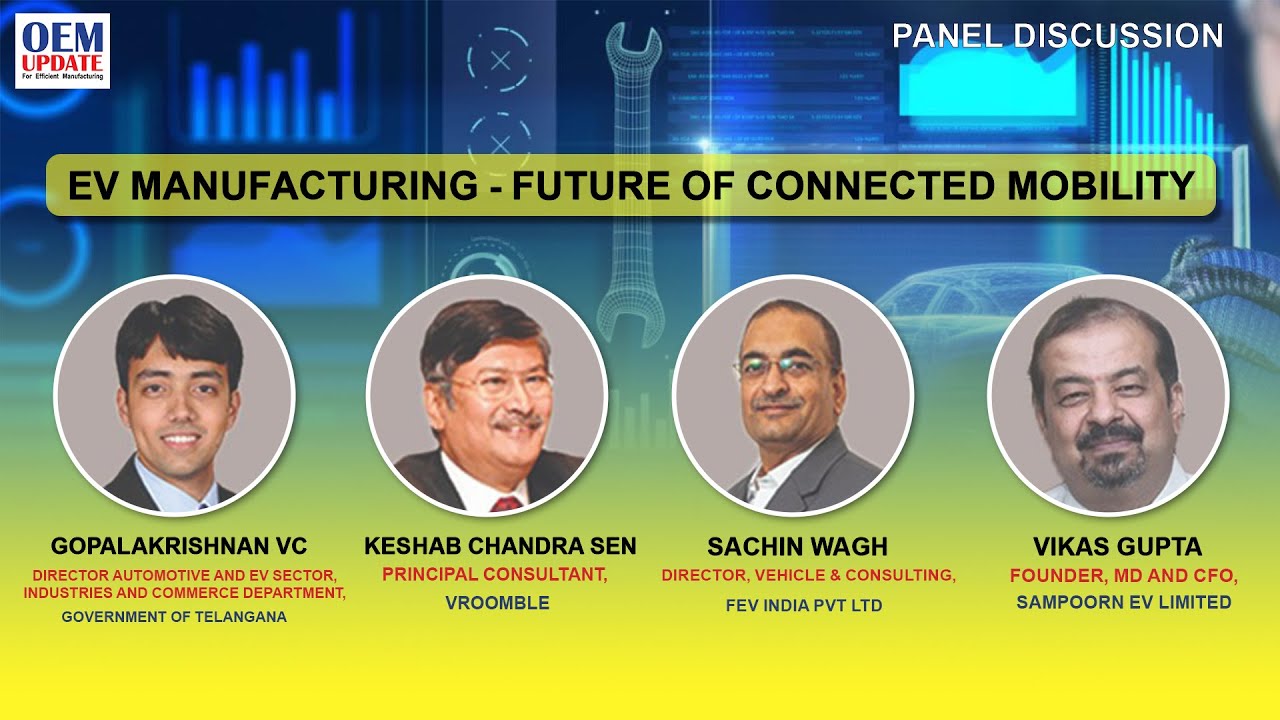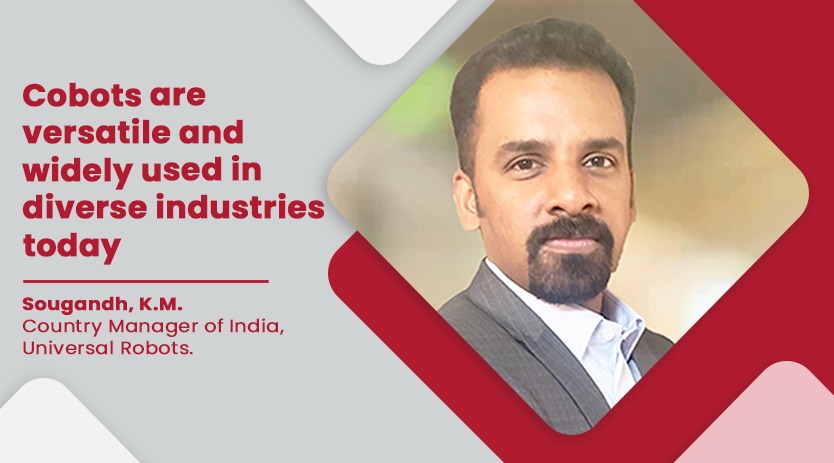We aim to lead in Automation solutions in India
April 1, 2023 7:09 pm
B. Karthik reveals that Fuji Electric India has an aggressive expansion strategy to become the leading provider of energy and automation solutions in India, including the launch of new products and solutions, extended sales reach, and adding people resources, R&D, and manufacturing capability in India. Given the expansion drive, we have invested in a new facility dedicated to automation in Chennai, aiming to produce 120K drives annually.
Can you describe the experience of Fuji Electric in serving the Indian market?
Fuji Electric has been active in the Indian market for over 30 years. The company began operations in 1985 through joint ventures to manufacture and distribute automation and instrumentation products. In 2009, Fuji Electric India Pvt. Ltd., a wholly-owned subsidiary of the Fuji Electric Group, was established. Over the past decade, Fuji Electric has expanded its presence throughout India, becoming a leader in drives for the lift and escalator industry and a provider of motion control solutions for packaging and special-purpose machines. Following its acquisition of Consul Neowatt, a prominent Indian UPS firm, in 2019, Fuji Electric India has a nationwide presence with over 1,000 employees serving customers in all industry verticals. Fuji Electric India has an aggressive expansion strategy to cement further its position as a leading provider of energy and automation solutions in India, including launching new products and solutions, expanding its sales reach, and investing in people, R&D, and manufacturing capabilities in India.
How are the automation and robotics landscape and drives and controls changing in Indian industries?
India is experiencing a period of substantial infrastructure development, with government policies driving large-scale industrial growth. India is poised to become a global manufacturing hub in a post-pandemic world. With the government’s focus on developing the manufacturing sector, it has become clear that increased efficiency, quality, and competitiveness are essential for success in the global market. As a result, many Indian industries are adopting automation to improve factory operations.
To capitalise on these developments, we have invested in a new automation facility in Chennai, which aims to produce 120K drives and 200K PCBs annually. As a market leader, Fuji Electric India offers advanced and complete machine and factory automation solutions, including servo motors and amplifiers for motion control systems, programmable controllers, and human-machine interfaces. As more sectors embrace automation and robotics, it has become an essential part of industrial processes.
How has Covid-19 affected automation in factories?
Automation has been around for a while, but now more than ever, there is a sense of urgency to invest in, acquire and implement new automated systems and services. This can be the key to our economic recovery after the pandemic. Automation not only improves efficiency and makes the workplace safer and less tedious, but it also helps businesses manage economic downturns and times of crisis like the Covid-19 pandemic.
Fuji Electric, for example, believes that to compete in the Indian market, they must create competitively priced products that can perform well in the challenging site and power conditions. They will leverage local R&D resources to achieve this and provide environmentally friendly solutions emphasising energy efficiency.
What steps can be taken to overcome the challenges SMEs and MSMEs face in adopting and implementing automation?
As automation faces new challenges and opportunities in the age of digitisation, particularly with Industry 4.0 and the Industrial Internet of Things (IIoT), managing the interoperability challenge in multi-vendor systems is considered the greatest obstacle to factory automation. Other concerns include integration and scalability issues, which can be difficult to incorporate into existing workflows and may require reorganisation and disruption. Cybersecurity is also a developing concern, as wirelessly connected machines could be vulnerable to hackers.
Despite these challenges, manufacturers can successfully adopt and implement automation if they understand the risks and take the necessary precautions. Companies must make strategic decisions at multiple levels, such as determining which operations to automate and how much automation to deploy using various technologies, from simple programmable logic controllers to sophisticated systems led by sensors and smart adaptive algorithms.
When evaluating the long-term benefits of factory automation, how do you factor in cost complications?
The pandemic significantly impacted productivity across various industries, and the manufacturing sector is still recovering from its effects. This has prompted manufacturers to reconsider the adoption of automation solutions.
Implementing factory automation systems can lead to faster production rates, improved product quality, and increased competitiveness, which are crucial for long-term success. Automation also enables round-the-clock productivity, reduces manufacturing time, eliminates repetitive tasks, and reduces the likelihood of human errors, resulting in higher product consistency and quality.
Despite potential cost complications, the benefits of automation make it a necessary investment for industries of all sizes. Switching to automation is essential for the survival and growth of businesses in the current market, and the long-term gains will likely outweigh any initial expenses.
What is your outlook on the future of the factory automation market, given the growth in automotive manufacturing?
According to SNS Insider, the factory automation sensor market is predicted to reach USD 25.69 billion by 2030 and grow at a CAGR of 6.4% during the forecast period from 2023-2030. This suggests a positive trend for the industrial sensor industry. Governments in several emerging economies are funding the adoption of advanced automation technologies to improve industrial operations.
At Fuji Electric, we are also preparing for this growth in demand. Our Automation division’s R&D team in Chennai is developing embedded firmware for AC drives specifically designed for the Indian environment and applications. We use cutting-edge HILS (Hardware-in-the-loop) simulators to test complex embedded systems with real-life conditions, reducing development time and validating performance under all actual site and power conditions. Japanese experts are present in India for joint product development and to train Indian engineers.
We are well-positioned to meet the increasing demand for automation in various sectors with our new automation factory in Chennai and a robust product portfolio, allowing us to serve the market efficiently.
Cookie Consent
We use cookies to personalize your experience. By continuing to visit this website you agree to our Terms & Conditions, Privacy Policy and Cookie Policy.



















 English
English Hindi
Hindi